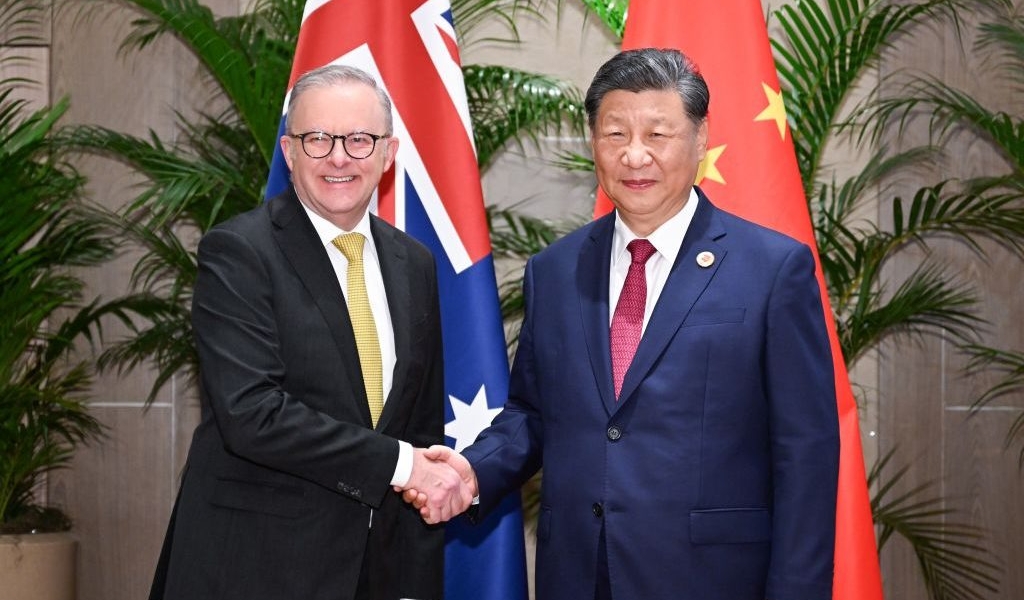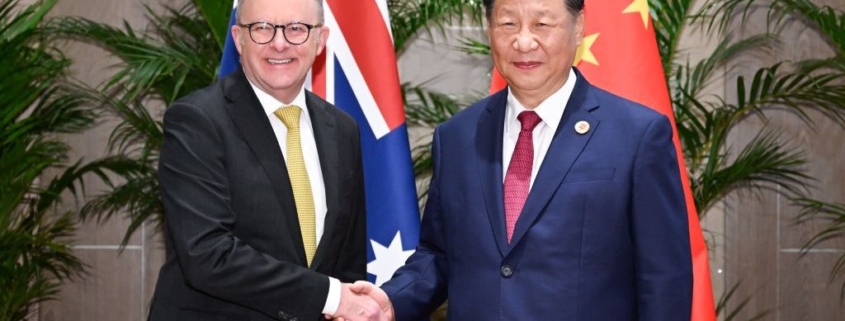Albanese’s China visit: views from ASPI analysts
Prime Minister Anthony Albanese will visit China from 12 to 18 July, his office said yesterday. He’ll meet President Xi Jinping and Premier Li Qiang.
Here are ASPI analysts’ views on the visit, what Albanese and Xi may discuss, and what the trip could mean for Australia.
Justin Bassi, executive director
China’s strategic ambition makes it impossible for any government to successfully separate a trading relationship with China from the security threat it poses.
While there is no doubt the so-called differences will be mentioned in private, any sign that they are secondary to an Australian priority of increased trade and ministerial meetings will result only in greater insecurity for Australia.
The Australian government should make clear that it prioritises security, sovereignty and human rights and, to that end, is willing to risk short-term economic and diplomatic engagement. If Beijing perceives that a government is prioritising money and meetings over security and sovereignty, the relationship will forever be unequal, unjust and unsafe.
This is all in the context of China breaching international law in the South China Sea; aggressively coercing Taiwan; conducting cyberattacks and interference operations, including against Australia; arbitrarily detaining Australian citizens such as Yang Hengjun; and enabling Russia’s war on Ukraine. If our economic and technological dependencies did not exist, we would be treating Beijing like Moscow, Tehran and Pyongyang. We should be doing everything possible to remove those dependencies.
Raji Pillai Rajagopalan, resident senior fellow
Albanese’ China visit is an important step towards the government’s goal of stabilised relations with Beijing. However, the government needs to be clear-eyed about the consequences of China’s behaviour for Canberra in terms of national security and the rules-based order in the Indo-Pacific and beyond.
Despite China’s problematic belligerent behaviour, a more stable relationship may bring a certain amount of predictability to our interactions with Beijing, as well as China’s regional behaviour. But we have been burnt on more than one occasion in the past few years, including by China’s economic and trade coercion. Hopefully we have learned the right lessons.
James Corera, director of the Cyber, Technology and Security Program
China’s track record of economic coercion, data exploitation and surveillance-technology exports should shape the basis for deep tech cooperation. That means that cooperation needs to proceed with eyes wide open. As ASPI has shown, Beijing views companies such as Huawei and Hikvision as tools of state influence.
Any deals on AI, electric vehicles or digital technologies should not be viewed through a trade-only lens. Cooperation shouldn’t come at the price of embedding authoritarian control into our infrastructure or ceding future digital sovereignty to Beijing. Some argue for assessing each technology or supplier individually, but that’s reactive, inconsistent and easy to exploit. Beijing doesn’t make those distinctions. It sees all its firms as potential tools of statecraft, and so should we.
In meetings with Xi, we should expect the prime minister to approach any discussions on technological cooperation with China prioritising Australia’s national interests and security. What this means in practice is that engagement should be approached with caution, ensuring that partnerships do not compromise our technological sovereignty or align us with systems that conflict with democratic values.
Courtney Stewart, deputy director of the Defence Strategy Program
While Australian domestic audiences may focus on trade normalisation with China, regional partners will be watching for signs that Australia could be a leader in upholding the rules-based global order. A second visit to China, without a visit to Washington or sustained signalling to our partnership network, risks reinforcing doubts about Australia’s collective security interests and resolve, when collective approaches are essential to countering coercive statecraft. In a contested Indo-Pacific, how Australia engages China matters to the region’s perception of collective unity, leadership and our future.
Nathan Attrill, China analyst
What Albanese says—or doesn’t say—about Taiwan will be heard far beyond Beijing. He can’t just talk trade and leave regional security off the table— especially when peace in the Taiwan Strait is central to a stable Indo-Pacific. The prime minister doesn’t need to provoke, but he does need to be principled.
Euan Graham, senior analyst
The awkward optics of the prime minister’s likely cordial meeting with Xi Jinping, contrasting with his failure to meet US President Donald Trump, won’t help to allay perceptions in Washington that Albanese is proving to be a fickle ally.
The other awkwardness for Australia is that this will be Albanese’s second visit to China as prime minister, but earlier hopes that Xi might visit Australia appear to have evaporated—suggesting this is not a relationship among equals from Beijing’s perspective.
Fergus Ryan, senior analyst
Beijing isn’t just pitching AI cooperation; it’s laying the groundwork for long-term digital dependency. Albanese can’t afford to walk into this meeting talking tech and trade without asking who holds the power behind the platforms. We’ve seen what happens when China ignores agreements it no longer finds useful. With AI, the stakes are far higher and far harder to unwind.


